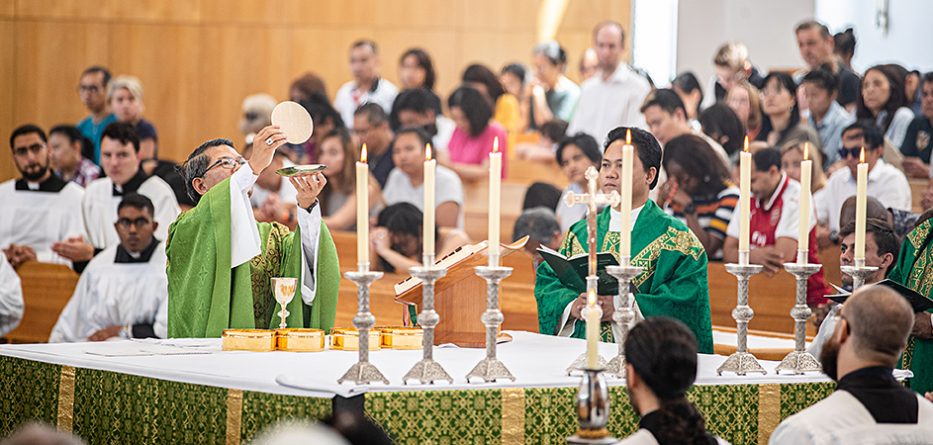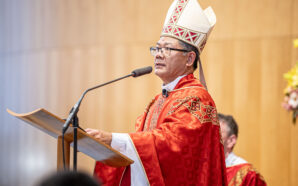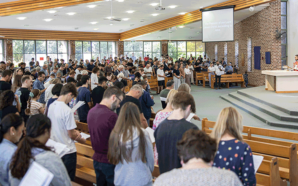Due to COVID-19 restrictions, many Catholics have not been able to attend an actual Mass, and so have ‘attended’ Mass by tuning into Mass online. When we normally would have shuffled along in the line to receive Holy Communion, we have been asked to make a Spiritual Communion by reciting:
“My Jesus, I believe that You are in the Blessed Sacrament. I love you above all things, and I long for You in my soul. Since I cannot receive you sacramentally, come at least spiritually into my heart. As though You have already come, I embrace You and unite myself entirely to You. Never permit me to be separated from You. Amen.”
This practice is good, and God will bless us and keep us close to Him through our sincere prayer. After all, God is present everywhere and can do all things.
The story goes that Saint Ignatius of Loyola (1491 – 1556) spent approximately a year trying to get closer to Jesus by living as a beggar, attending Mass daily, spending his days in prayer and by scourging himself as repentance for his sins. One day he sat on the banks of a river in Manressa, Catalonia, Spain, he watched as a woman did her family’s washing in the river; her children happily playing near her. The sun was shining. The birds were singing. And Saint Ignatius felt happy. He realised that day, that God was present in all people, in all things and in every situation; and that God enjoyed and loves His Creation and wants us to enjoy it with Him and to give Him thanksgiving and our love.
This new attitude of Saint Ignatius later influenced his Jesuits and in turn the Catholic Church (particularly at the Council of Trent (1545 – 1563)). The Council of Trent changed the way the Mass was celebrated and the Tridentine Latin Mass was how Roman Catholics celebrated the Mass until Vatican II. This (then) new attitude of God’s Loving Presence within all things influenced the appearance of the Catholic Churches. Baroque architecture emerged. Its’ churches were highly ornamental, theatrical and sensual, e.g. Il Gesu in Rome; St. Paul’s in London. Baroque music was grandiose, dramatic, energetic, e.g. Handel’s ‘Messiah’; Vivaldi’s ‘Four Seasons’. Church interiors had painted life-sized statues and highly coloured, dramatic, realistic-looking paintings.
The best bit of Ignatius’ understanding of the closeness of God lay in a deeper understanding of Holy Communion. When you receive the Sacred Host, you are holding the Presence of our dear Lord in your earthly human hands. You then eat it and perhaps drink a little of the wine. We are subtly being taught a lesson. Just as the little wafer and sip of wine is digested as food and drink by your body, Jesus, who is sacramentally present in the bread and the wine becomes a part of your soul. Just as food and drink become a part of your body providing nourishment and healing and helping you grow, the Eucharist provides spiritual nourishment, healing of your inner wounds caused by your sins and those who have hurt you, and it helps you grow in virtue so that with repeated reception of this sacrament you grow to be more like Jesus, and you become spiritually connected with other people who are doing likewise, by the power of Jesus’ Holy Spirit. At the Last Supper “Jesus took bread, gave thanks and broke it, and gave it to his disciples, saying ‘Take and eat; this is my body.’ Then he took the cup, gave thanks and offered it to them, saying, ‘Drink from it, all of you. This is my blood of the covenant, which is poured out for many for the forgiveness of sins.’” (Mt 26: 26-27).
Receiving Holy Communion at an actual Mass with others who are receiving Our Lord too is a deeply spiritual and sensual experience because it involves the whole person and other parts of the Body of Christ (people). It pleased God to make us as spiritual beings with physical bodies. In the spirit of Saint Ignatius, this is why Catholic Churches have lit candles, incense, holy water, flowers, statues, stained-glass windows. It is all meant to lift your heart and mind to God, drawing us closer in love to the God who loves us.
Live-streamed Masses have been necessary during the COVID-19 restrictions, and in many ways have given people the opportunity to deepen their prayer lives. All prayer when we honestly open up our hearts and lives is good and pleasing to God. We can pray to God in many ways, and God makes His Presence known to us in many ways (Spiritual Communion being one of these ways). However, God made us to be sensual creatures of flesh and blood who have souls to be filled with God’s Presence as the Word-made-flesh. Nothing beats receiving Holy Communion at an actual Mass.
Teresa Prior is a parishioner of St Joseph’s Parish, Kingswood, and a member of the Western Deanery Pastoral Council.








